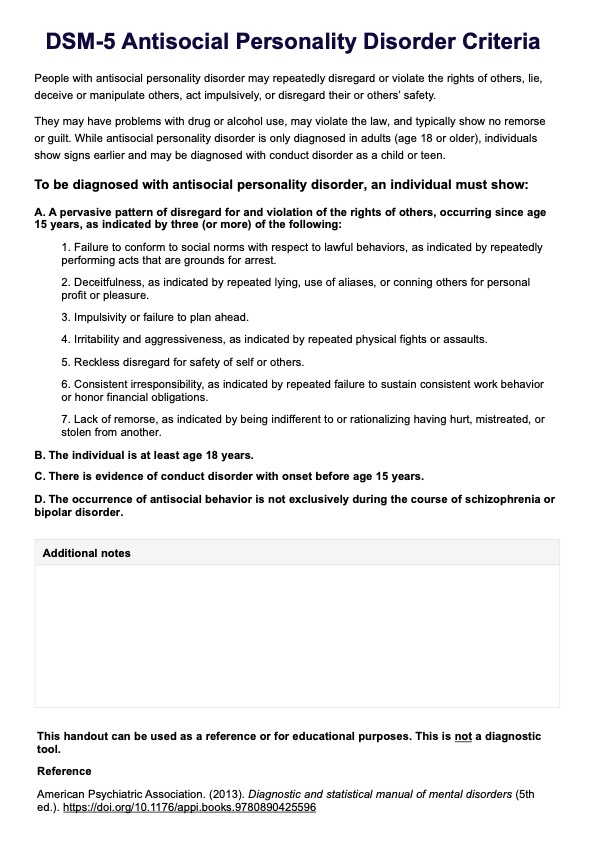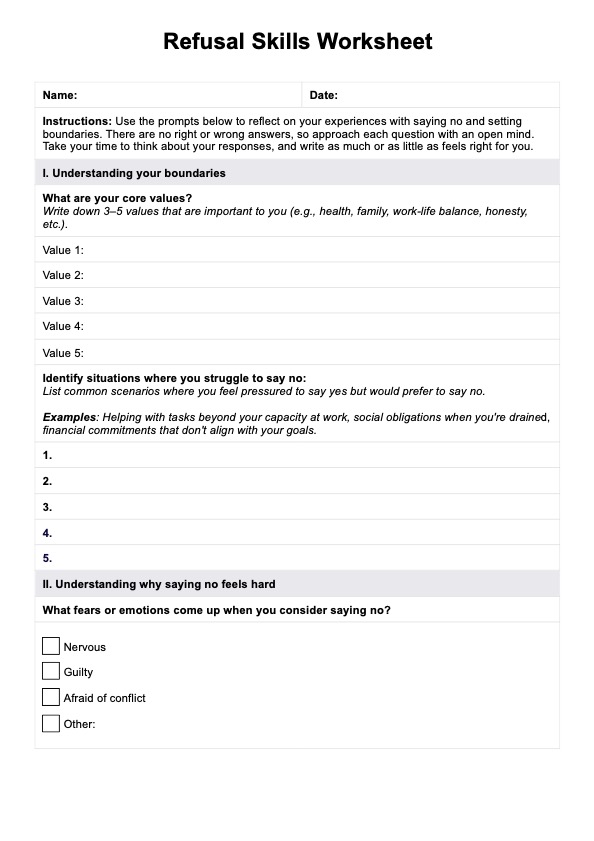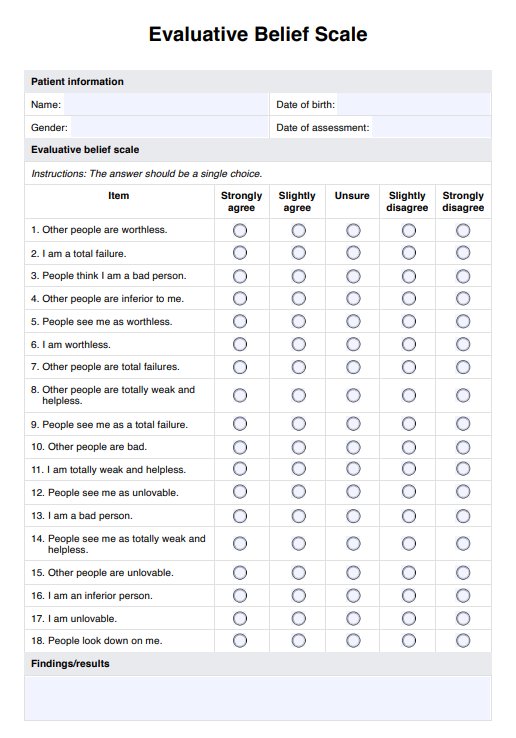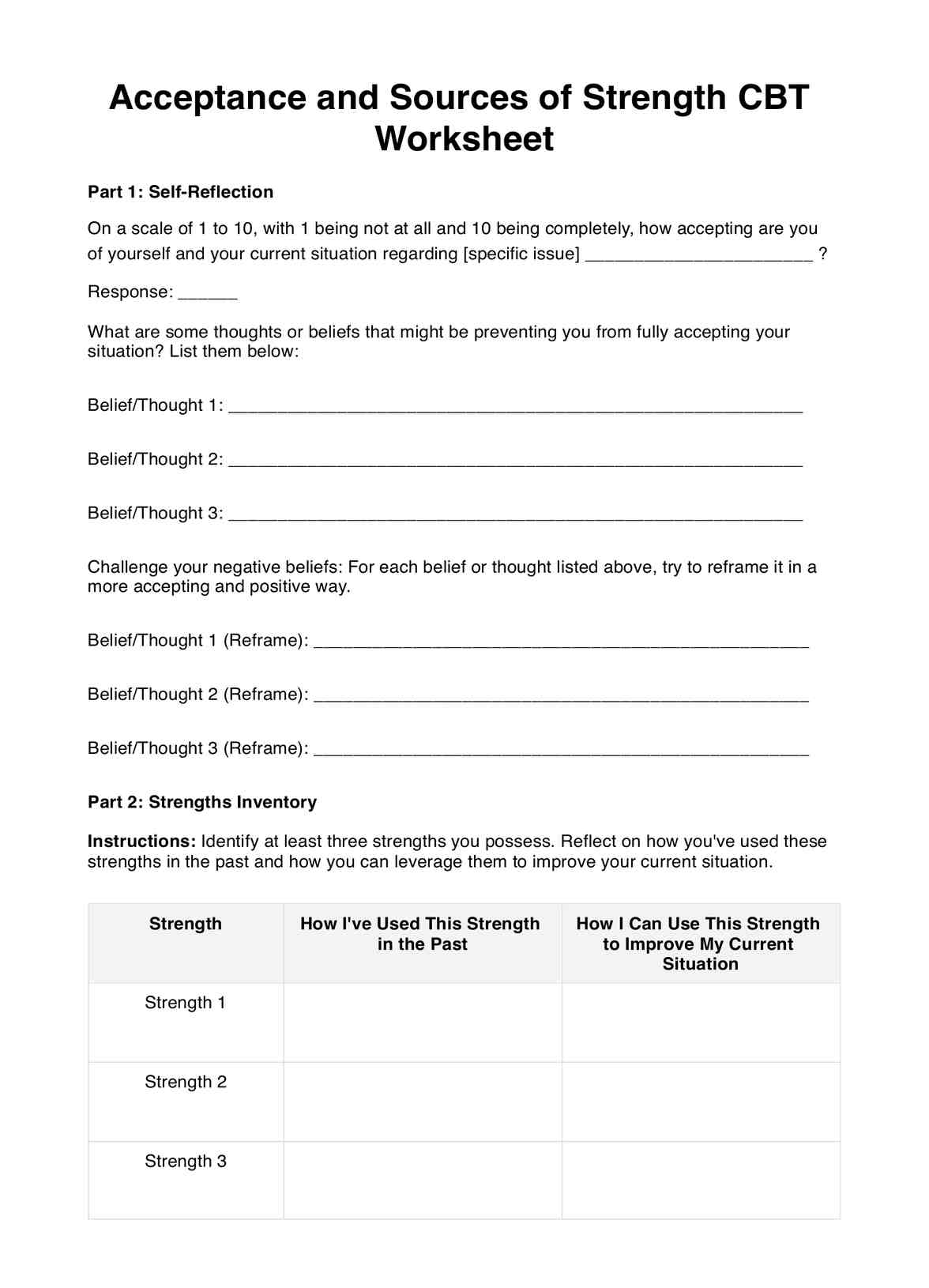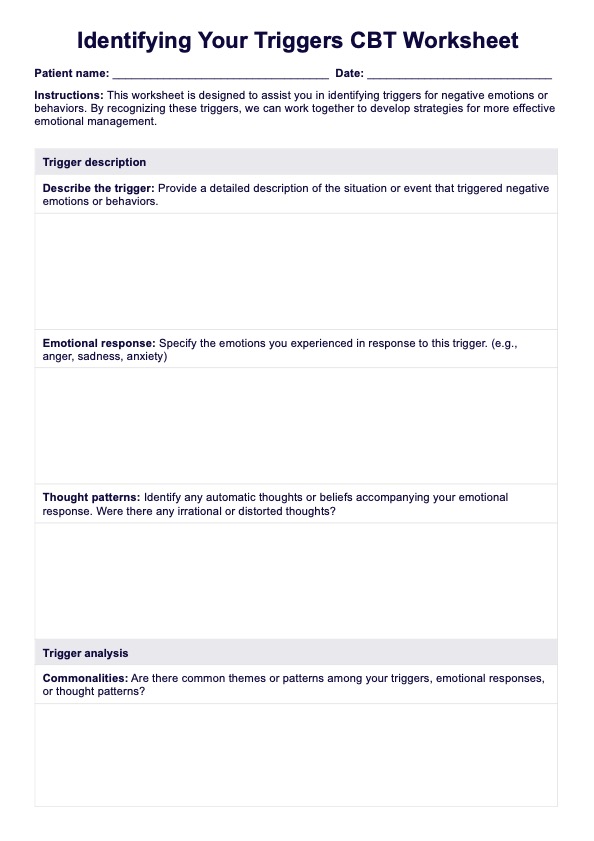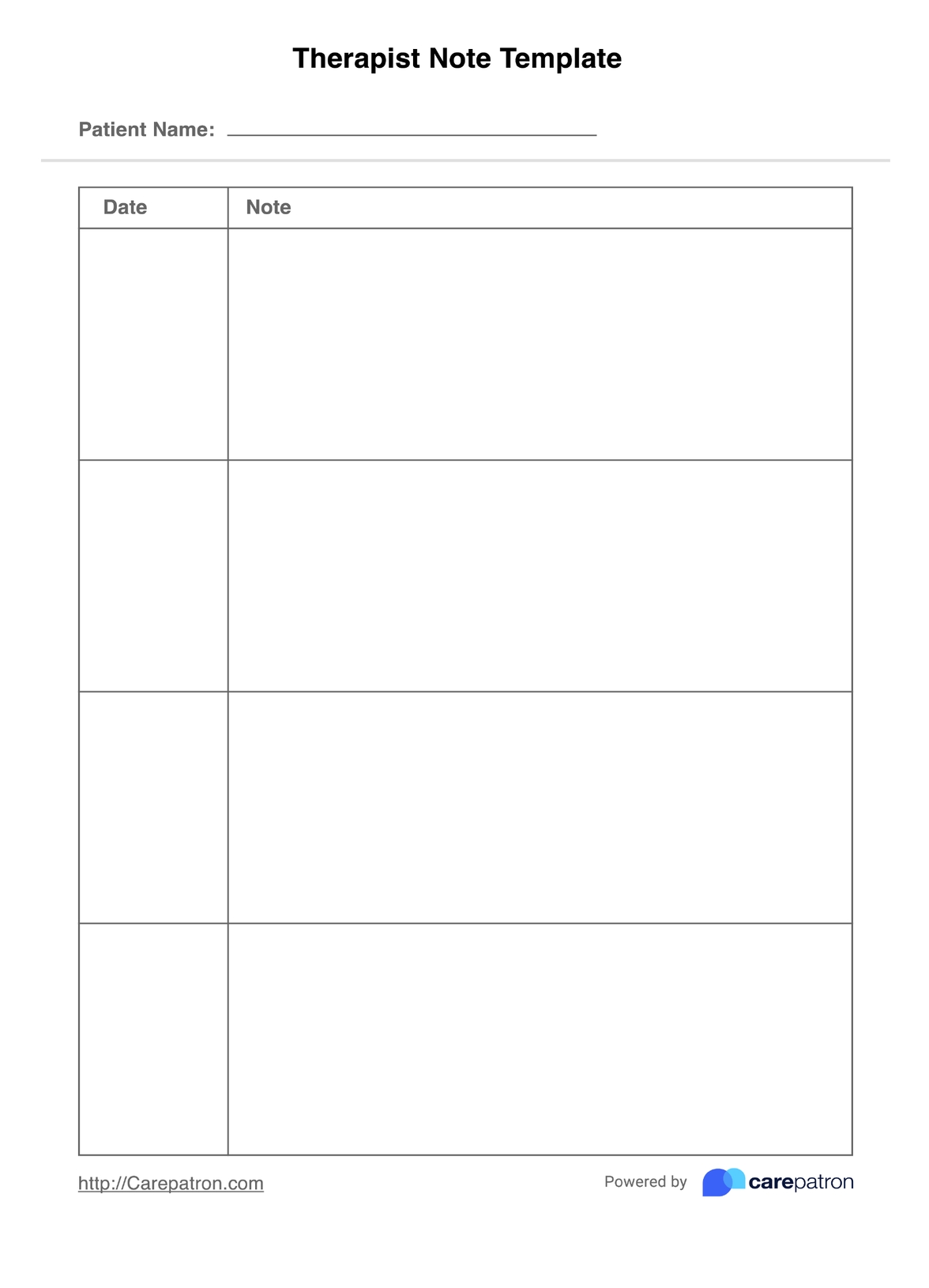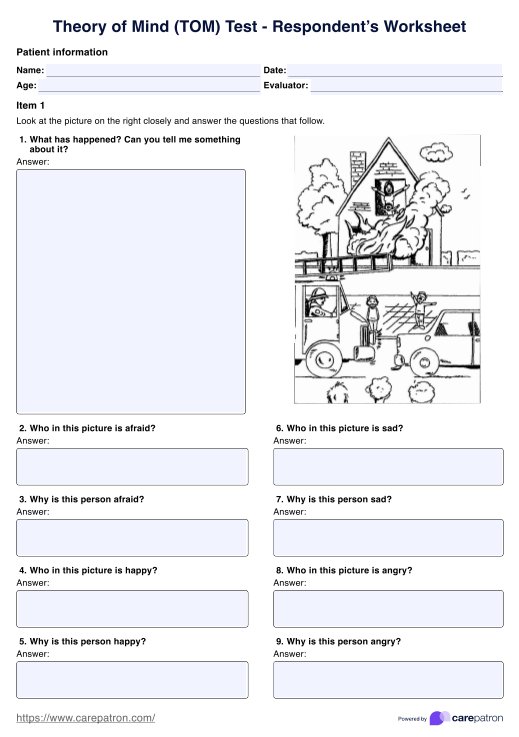Memory Test
Looking to assess your patients' memory function? Learn how Carepatron's Memory Test assessment tool can help you accurately evaluate cognitive performance.


What is a Memory Test template?
Our Memory Test Template is a practical tool designed for healthcare professionals to systematically assess a patient’s memory function. It provides a standardized framework for gathering patient information, conducting cognitive tests, and recording results efficiently.
The template includes a range of various memory tests, each targeting different aspects of cognitive skills and aiding in the early detection of conditions such as memory loss and frontotemporal dementia. These include the spatial memory test, word list recall test, story recall test, and digit span test. The spatial memory test evaluates a patient’s ability to store and recall visual information, testing visuospatial memory, which is often affected in neurological disorders.
Additionally, the word list recall test measures immediate recall, learning ability, and delayed recall, helping detect memory issues associated with aging or specific conditions. The story recall test assesses narrative memory, challenging patients to remember details and recall events both immediately and after a delay, which is useful in identifying cognitive deficits related to memory loss. The digit span test examines working memory and problem-solving skills, asking patients to memorize, repeat, and retain increasingly larger numbers in forward and backward sequences, helping clinicians evaluate cognitive load and processing ability.
However, it's important to note that this test template is not a validated tool or a diagnostic tool. It is intended to be used as a preliminary assessment to screen for potential memory or cognitive issues and guide further evaluation. Clinicians should interpret the results with caution and use them alongside clinical observations, patient history, and other standardized assessments when forming a diagnosis or treatment plan. If significant cognitive deficits are detected, referral to a specialist for comprehensive testing is recommended.
Memory Test Template
Memory Test Example
How to use our Memory Test template
Follow these steps to utilize the template effectively in clinical practice:
Step 1: Access the template
Access the template directly from this guide by clicking the “Use this template” button, allowing you to modify the content via teh Carepatron app. For a PDF copy, you can click "Download." Alternatively, you can search for "Memory Test" in Carepatron’s template library, available on both the website and app.
Step 2: Prepare for the test
Before starting the assessment, complete the required fields in the template, including the patient’s name, clinician’s name, and date of the examination. Familiarize yourself with the step-by-step instructions provided in the template to ensure accurate test administration.
Step 3: Perform and document the test
Conduct the Memory Test by following the instructions outlined in the template. The test includes multiple components that evaluate different aspects of memory function. Document relevant notes directly in the template to maintain detailed and accurate records.
Step 4: Interpret the results
Use the template to record and analyze the patient’s performance. Each test has a standardized scoring system, categorizing results into normal performance, mild to moderate impairment, or severe impairment. If results are indicative memory deficits, consider additional assessments to further evaluate the patient’s cognitive health.
Step 5: Plan further assessment
The Memory Test is a screening tool and should be used alongside other diagnostic methods, including patient history, neuropsychological testing, and imaging studies. Use the template to document recommendations for further evaluation, such as referrals, additional cognitive testing, or treatment strategies based on the results.
Step 6: Save the template securely
After completing the assessment, store the template securely as part of the patient’s medical records. Carepatron’s digital documentation system ensures safe storage and easy access while maintaining confidentiality. If using a paper copy, store it in a secure and confidential location to protect patient privacy.
By using the Memory Test Template, clinicians can streamline the cognitive assessment process, improve diagnostic accuracy, and ensure consistent and reliable documentation when evaluating a patient’s memory function.
Benefits of using our Memory Test template
Our Memory Test template is designed to help healthcare professionals streamline memory assessments, ensuring consistency, accuracy, and efficiency in clinical practice.
Standardized and reliable assessment
The Memory Test template provides clear, structured guidelines for assessing memory function, ensuring consistency across different evaluations. This allows clinicians to write detailed records of test results and compare a patient’s memory over time. By following a uniform format for every patient, professionals can track cognitive changes more accurately and detect early warning signs of impairment.
Comprehensive cognitive evaluation
This template includes multiple validated memory assessment tools, providing a well-rounded evaluation of human brain function. By covering different aspects of cognitive function, this template allows for a holistic evaluation of the patient’s brain health, helping clinicians pinpoint specific areas of concern and determine whether further evaluation is necessary.
Efficient documentation and record-keeping
The template offers a structured format for recording patient responses and test results, making it easier to write findings quickly and efficiently. This helps reduce administrative burden while ensuring that all critical information is captured in one organized and accessible location. Digital integration with electronic health records (EHR) also enhances data management, making it easier for professional teams to talk about and analyze diagnostic trends.
Early detection of memory impairments
By using a structured memory assessment, clinicians can begin identifying early signs of cognitive impairment that may indicate dementia, Alzheimer's disease, or other neurological conditions. Early detection allows for timely intervention, including further diagnosis, treatment planning, and lifestyle modifications to help improve memory retention. Detecting cognitive decline in its early stages also enables patients and their family members to prepare for the future by considering medical care and support options.
Again, our Memory Test template is intended for screening purposes only and is not a validated or diagnostic tool. It should be used alongside clinical judgment, patient history, and additional assessments to provide a complete evaluation
Commonly asked questions
This test is intended as a screening tool for detecting cognitive impairment, assessing long-term memory and recall abilities. While it cannot diagnose conditions like dementia, a doctor or therapist may recommend further evaluation if significant memory difficulties are observed.
A family member may feel concerned if a loved one struggles to remember things, especially if memory lapses are frequent. While occasional forgetfulness can result from stress or anxiety, ongoing difficulties may indicate underlying cognitive issues and should be assessed by a healthcare professional.
Yes, this template has been developed for use across the world in mental health and neurological settings. It helps assess how well patients store information and form memories, ensuring their brains are evaluated correctly with respect to their cognitive abilities.


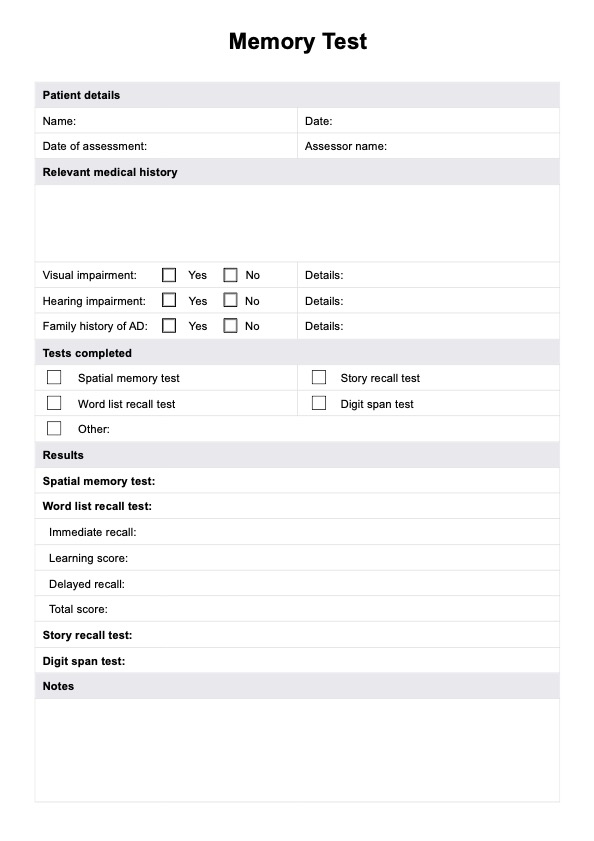
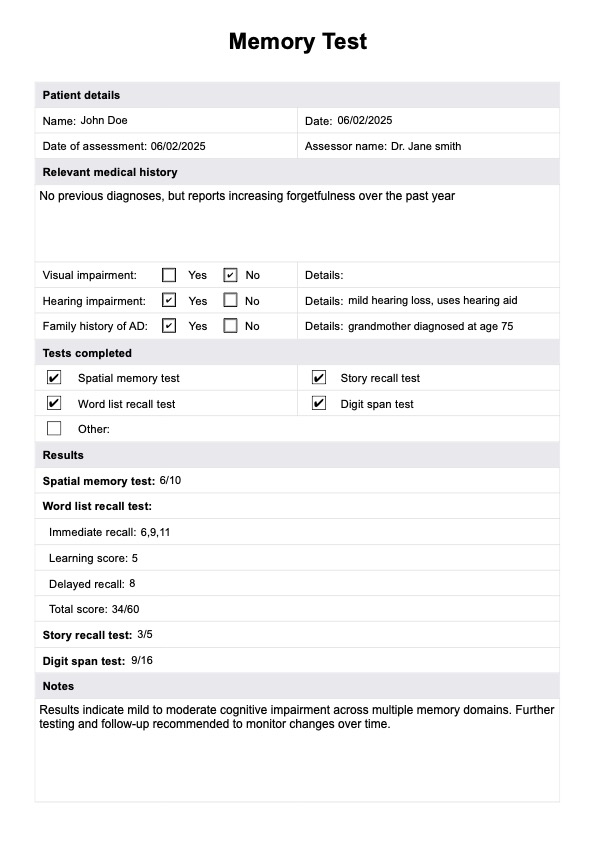



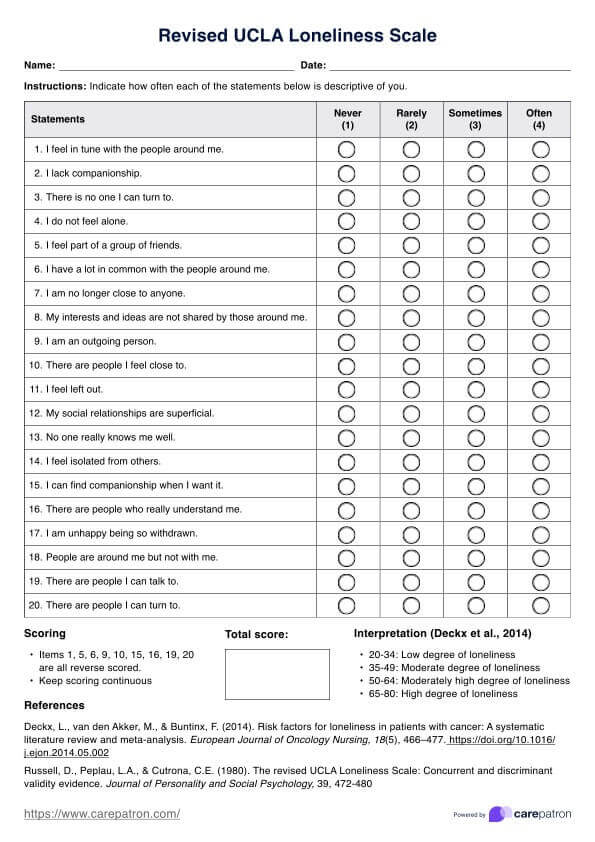














-template.jpg)


















































































